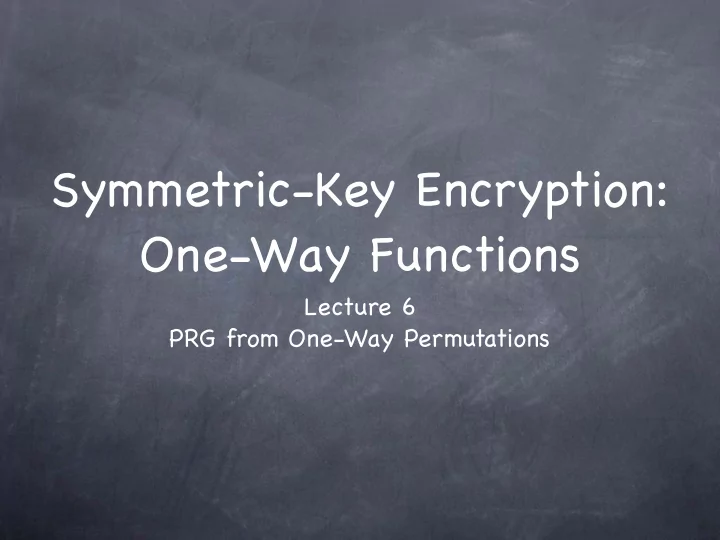

Symmetric-Key Encryption: One-Way Functions Lecture 6 PRG from One-Way Permutations
RECALL Story So far m Enc SC PRG (i.e., a Stream Cipher) for one-time SKE ⊕ K “Mode of operation”: msg ⊕ pseudorandom pad PRF (i.e., a Block Cipher) for full-fledged SKE m Many standard modes of operation: (block) Enc OFB, CTR, CBC, … K BC ⊕ All provably secure if the Block Cipher is a PRF (or PRP with trapdoor, for CBC). r CTR mode is recommended (most efficient) In practice, fast/complex constructions for Block Ciphers But a PRF can be securely built from a PRG
RECALL PRG coming up k k G R k Can build a PRG from a one-bit stretch PRG, 1 G k : {0,1} k → {0,1} k+1 Can use part of the PRG output as a new seed ... G G G G G R k Stream cipher: the intermediate seeds are never output, can keep stretching on demand (for any “polynomial length”)
One-Way Function, Hardcore Predicate f k : {0,1} k → {0,1} n(k) is a one-way function (OWF) if f is polynomial time computable f(x) For all (non-uniform) PPT adversary, probability x’ of success in the “OWF experiment” is negligible x ← {0,1} k But x may not be completely hidden by f(x) f(x’)=f(x)? Yes/No B is a hardcore predicate of a OWF f if B is polynomial time computable f(x) b’ For all (non-uniform) PPT adversary, advantage over random prediction in the Hardcore- x ← {0,1} k b’ = B(x)? predicate experiment is negligible Yes/No B(x) remains “completely” hidden, given f(x)
One-Way Function Candidates Integer factorization: f mult (x,y) = x ⋅ y Input distribution: (x,y) random k-bit primes Fact: taking input domain to be the set of all k-bit integers, with input distribution being uniform over it, will also work (if k-bit primes distribution works) In that case, it is important that we require |x|=|y|=k, not just |x ⋅ y|=2k (otherwise, 2 is a valid factor of x.y with 3/ 4 probability)
One-Way Function Candidates Solving Subset Sum: f subsum (x 1 ...x k , S) = (x 1 ...x k , Σ i ∈ S x i ) Input distribution: x i k-bit integers, S ⊆ {1...k}. Uniform Inverting f subsum known to be NP-hard, but assuming that it is a OWF is “stronger” than assuming P ≠ NP Note: (x 1 ,…,x k ) is “public” (given as part of the output to be inverted) OWF Collection: A collection of subset sum problems, all with the same (x 1 ,…,x k ) (and independent S)
One-Way Function Candidates Goldreich’ s Candidate: f Goldreich (x, S 1 ,…,S n , P) = (P(x| S1 ),…,P(x| Sn ),S 1 ,…,S n , P) x ∈ {0,1} k , S i ⊆ [k] with |S i |=d, P:{0,1} d → {0,1}, and x| S stands for x restricted to indices in S Input distribution: uniformly random with the requisite structure OWF Collection: (S 1 ,…,S n ,P) forms the index
One-Way Function Candidates Rabin OWF: f Rabin (x; n) = (x 2 mod n, n), where n = pq, and p, q are random k-bit primes, and x is uniform from {0...n} OWF collection: indexed by n More: e.g, Discrete Logarithm (uses as index: a group & generator), RSA function (uses as index: n=pq & an exponent e). Later
Hardcore Predicates For candidate OWFs, often hardcore predicates known e.g. if f Rabin (x;n) is a OWF , then LSB(x) is a hardcore predicate for it Reduction : Given an algorithm for finding LSB(x) from f Rabin (x;n) for random x, one can use it to invert f Rabin
Goldreich-Levin Predicate Given any OWF f, can slightly modify it to get a OWF g f such that g f has a simple hardcore predicate g f is almost as efficient as f; is a permutation if f is one g f (x,r) = (f(x), r), where |r|=|x| Input distribution: x as for f, and r independently random GL-predicate: B(x,r) = <x,r> (dot product of bit vectors) Can show that a predictor of B(x,r) with non-negligible advantage can be turned into an inversion algorithm for f Predictor for B(x,r) is a “noisy channel” through which x, encoded as (<x,0>,<x,1>...<x,2 |x| -1>) (Walsh-Hadamard code), is transmitted. Can efficiently recover x by error-correction (local list decoding).
PRG from One-Way Permutations k k G R k One-bit stretch PRG, G k : {0,1} k → {0,1} k+1 1 G(x) = f(x) ◦ B(x) Where f: {0,1} k → {0,1} k is a one-way permutation, and B a hardcore predicate for f bijection Claim: G is a PRG For a random x, f(x) is also random (because permutation), and hence all of f(x) is next-bit unpredictable. B is a hardcore predicate, so B(x) remains unpredictable after seeing f(x)
Summary OWF: a very simple cryptographic primitive with several candidates Every OWF/OWP has a hardcore predicate associated with it (Goldreich-Levin) PRG from a OWP and a hardcore predicate for it A PRG can be constructed from a OWF too, but more complicated. (And, some candidate OWFs are anyway permutations.) PRF from PRG PRG can be used as a stream-cipher (for one-time CPA secure SKE), and a PRF can be used as a block-cipher (for full-fledged CPA secure SKE)
Recommend
More recommend